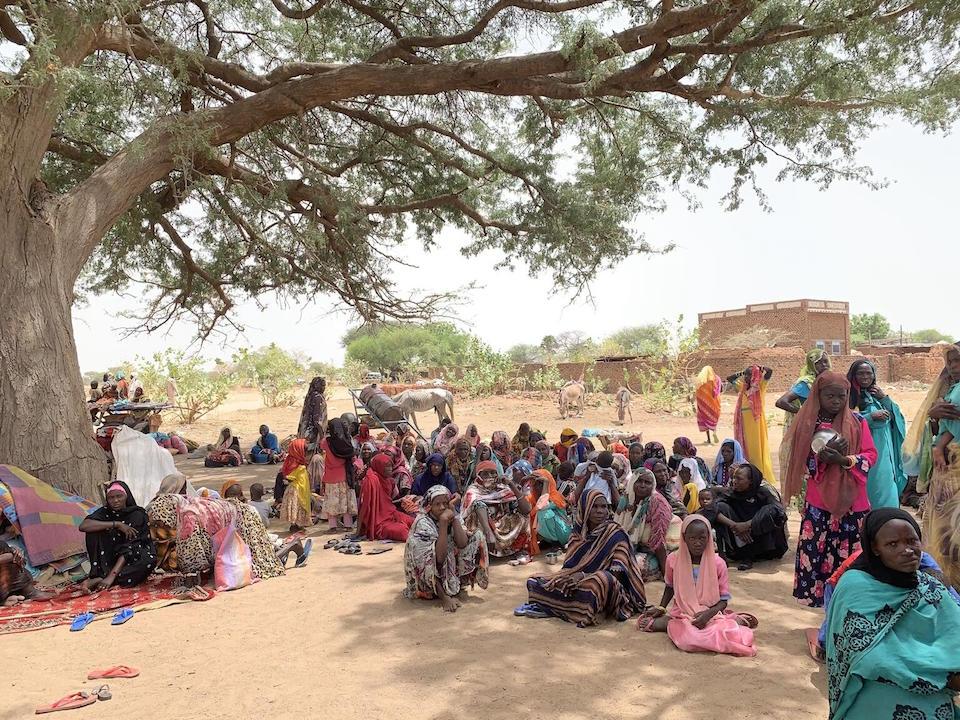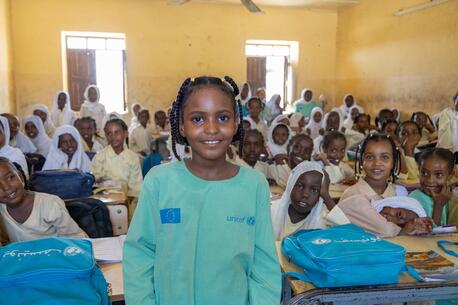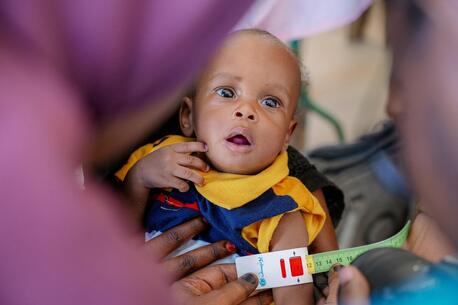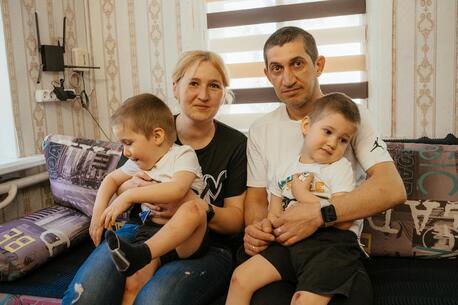
Children in Sudan at High Risk as Armed Conflict Continues
As the fighting intensifies, UNICEF remains committed to providing vital support and services to vulnerable children and families both in Sudan and in neighboring countries.
Children exposed to recruitment and use by armed groups, sexual violence
Escalating armed conflict in Sudan is rapidly worsening an already dire humanitarian situation for millions of children.
At least nine children have reportedly been killed and more than 50 injured since fighting between the Sudanese Armed Forces and paramilitary Rapid Support Forces began on April 15. Hostilities in Khartoum, the Darfurs and North Kordofan are displacing families and further exposing children to recruitment and use by armed groups, as well as sexual violence.
Access to essential supplies — food, bottled water, medicine, fuel for cooking and cars — is limited. In some areas, prices have risen by 40 to 60 percent, sometimes more.

UNICEF priorities: child protection, health care, essential supplies
Despite the challenges faced by the ongoing crisis, UNICEF is committed to providing vital support and services for children and families in need in Sudan and those who have fled to neighboring countries.
UNICEF's top priorities include:
- ensuring safe passage and protection for children
- maintaining access to health care and other critical services
- responding to new humanitarian needs, including emergency education supplies and psychosocial support
Children and families fleeing violence need urgent humanitarian aid
According to UNHCR, at least 270,000 people are expected to flee Sudan into neighboring countries including the Central African Republic, Chad and Egypt.
Some 20,000 have already streamed across the border into Chad and more are arriving every day. Refugees in the village of Koufroun, Chad, across a dry riverbed from Sudan, already outnumber the villagers, putting immense pressure on local resources.
No rain in six months, and a shortage of safe drinking water
With temperatures climbing above 100 degrees Fahrenheit, access to safe water is a crucial concern. Lack of safe water increases the risk of waterborne disease outbreaks, including cholera.
"The refugee population there has literally nothing," said Donaig Le Du, UNICEF Chad's Chief of Communications. "They're sitting on the border. There's no shelter. There's nothing. It's extremely hot. It hasn't rained in over six months. So these are very dire situations, and UNICEF is on the ground and doing anything to help."
UNICEF and partners are working to provide safe drinking water and distributing much-needed essential supplies including mats, blankets, cooking kits, mosquito nets, water containers and soap to refugees.

© UNICEF/UN0834352/Le Du
Even before the current crisis, about one-third of Sudan's population required humanitarian assistance
Before the current conflict, some 15.8 million people in Sudan required humanitarian assistance. The nation has one of the world's highest rates of child malnutrition; 2.7 million children were already malnourished. The conflict has disrupted the lifesaving treatment of an estimated 50,000 children suffering from severe acute malnutrition.
Seven million children were already out of school before the nation's schools shut down completely. Some 70 percent of 10-year-olds could not read or understand a simple sentence.
1 in 3 health centers in Sudan no longer functioning
According to the World Health Organization, one-third of the nation's health care facilities are no longer functioning, depriving children and their families of essential health care.
Constant cuts in power and fuel are jeopardizing the cold chain that keeps vaccines and medicines like insulin at optimal temperatures during transport and storage, putting at risk the lives of millions of children in a country where vaccination rates were already falling and where children face regular disease outbreaks.
Millions of under-vaccinated or zero-dose children will miss out on lifesaving vaccines, exposing them to deadly and debilitating diseases like measles and polio.

Children in Sudan need peace, not violence
"Children are bearing the brunt of the conflict in Sudan," said Mandeep O'Brien, UNICEF Representative in Sudan. "They are dying, and their futures are being taken away from them. The impacts of preventing vulnerable children from receiving health, protection and education services will last a lifetime. The fighting must stop so we can urgently better reach all vulnerable children wherever they are."
Help UNICEF reach children caught in conflict with the urgent support and services they need. Your contribution can make a difference. Please donate.
HOW TO HELP
There are many ways to make a difference
War, famine, poverty, natural disasters — threats to the world's children keep coming. But UNICEF won't stop working to keep children healthy and safe.
UNICEF works in over 190 countries and territories — more places than any other children's organization. UNICEF has the world's largest humanitarian warehouse and, when disaster strikes, can get supplies almost anywhere within 72 hours. Constantly innovating, always advocating for a better world for children, UNICEF works to ensure that every child can grow up healthy, educated, protected and respected.
Would you like to help give all children the opportunity to reach their full potential? There are many ways to get involved.





